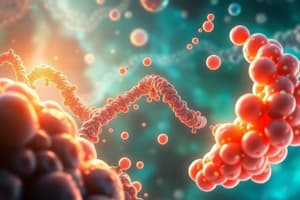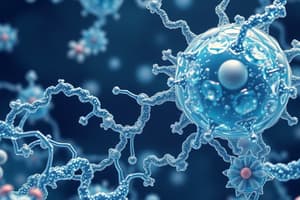Podcast
Questions and Answers
What is the study of plant distributions known as?
What is the study of plant distributions known as?
- Plant ecology
- Plant genetics
- Plant anatomy
- Phytogeography (correct)
What are the four major types of biomolecules?
What are the four major types of biomolecules?
- Proteins, lipids, polysaccharides, and monosaccharides
- Carbohydrates, lipids, nucleic acids, and hormones
- Carbohydrates, proteins, lipids, and nucleic acids (correct)
- Carbohydrates, lipids, nucleic acids, and vitamins
What is the general chemical formula for carbohydrates?
What is the general chemical formula for carbohydrates?
- Cx(OH)y
- Cx(H2O)y (correct)
- Cx(H2)y
- Cx(H)y
What is the function of lipids in the body?
What is the function of lipids in the body?
What is the term for the study of plant anatomy?
What is the term for the study of plant anatomy?
What is the study of plant reproduction known as?
What is the study of plant reproduction known as?
What are nucleic acids primarily responsible for?
What are nucleic acids primarily responsible for?
What is the term for the study of plant evolution?
What is the term for the study of plant evolution?
What is the study of plant biochemistry known as?
What is the study of plant biochemistry known as?
What is the term for the study of the timing of germination, flowering, and fruiting?
What is the term for the study of the timing of germination, flowering, and fruiting?
Flashcards are hidden until you start studying
Study Notes
Proteins
- Proteins are made up of building blocks called amino acids
- There are about 20 different amino acids that link together in different combinations
- Proteins are required for the structure, function, and regulation of the body's tissues and organs
Water and its Properties
- Water is polar, with partial positive charges on the hydrogens and a partial negative charge on the oxygen, and a bent overall structure
- Water is an excellent solvent, able to dissolve many polar and ionic substances
- Water has high heat capacity, requiring a lot of energy to raise its temperature
- Water has high heat of vaporization, allowing it to cool off living organisms through evaporation
- Water's cohesive and adhesive properties enable fluid transport in many forms of life
Minerals and their Functions
- Around 105 minerals have been discovered, with about 60-65 absorbed by plants from the soil
- Different species of plants take up different minerals
- Minerals like phosphorus and magnesium are essential for plant reproduction, growth, and development
- Mineral deficiencies can result in stunted growth, insufficient chlorophyll, and cell senescence
- Potassium elements increase the quality of fruits and vegetables
Water in Plants
- Water acts as a solvent, allowing plants to absorb nutrients
- Water makes up over 90% of the plant body and is essential for photosynthesis
- Water helps maintain cell walls, enables cell enlargement and division, and is essential for germination and growth
- Water is involved in the conversion of starch to sugar and regulates plant temperature
Plant Biology
- Paleobotany: the study of fossil plants and plant evolution
- Plant biochemistry: the chemical processes of primary and secondary metabolism
- Phenology: the timing of germination, flowering, and fruiting
- Phytochemistry: plant secondary chemistry and chemical processes
- Phytogeography: plant biogeography, the study of plant distributions
- Plant anatomy: structure of plant cells and tissues
- Plant ecology: role and function of plants in the environment
- Plant genetics: genetic inheritance in plants
- Plant morphology: structure of plants
- Plant physiology: life functions of plants
- Plant reproduction: processes of plant reproduction
- Plant taxonomy: classification and naming of plants
Biomolecules
- Biomolecules are substances produced by cells and living organisms
- The four major types of biomolecules are carbohydrates, lipids, nucleic acids, and proteins
- Carbohydrates are naturally occurring compounds with the general formula Cx(H2O)y, made up of carbon, hydrogen, and oxygen
- Carbohydrates are divided into four types: monosaccharides, disaccharides, oligosaccharides, and polysaccharides
- Lipids are fatty compounds that perform various functions in the body, including energy storage and vitamin absorption
- Nucleic acids are naturally occurring chemical compounds that serve as the primary information-carrying molecules in cells, including DNA and RNA
Studying That Suits You
Use AI to generate personalized quizzes and flashcards to suit your learning preferences.




